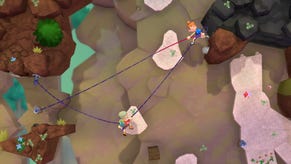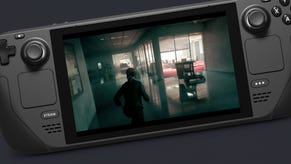What makes games frustrating?
And what makes us keep playing?
What have you been up to this week? I've spent most of it staring at a near-vertical assortment of pipes and beams and wishing I was dead. I've also been inventing guttural new expletives that threaten to bring Social Services to the door. God only knows what the neighbours have made of it.
Late to the party I know but yes, I've been playing Trials HD. I have spent significantly more time failing at the game than making progress. And yet, this has been one of the most enjoyable gaming experiences I've had in the last five years.
For the purpose of this article it's really not important that I'm stuck in a game - we've all been there. What matters is that, following a six hour marathon trapped in the same desperate cycle of failure, I can only bring myself to turn the console off for five minutes before rebooting for just one more go.
When I fall asleep, I do so with mental attempts to solve in-game problems playing out behind my closed eyes. So strongly has the Tetris-effect taken hold that after a prolonged session, I can no longer view a column of text without it rocking to and fro while my brain calculates the necessary movements to traverse it.
Clearly this calls for a moment of introspection. There are, after all, no shortage of games featuring revolutions in story-telling, impressive visuals and protracted narratives. There's also no time in which to play more than a small percentage of them. So what compels me to spend so much time in abject misery for what appears to be a deficit of pay-off?
The transformation of my gaming habits began with Geometry Wars: Retro Evolved, back in 2005. It was ironic becauses since the days of 16-bit hardware, I had happily believed that if I threw myself behind the juggernaut of hardware progression and queued up giddily on day one, gaming nirvana would be assured. RPG vistas would become ever grander, racing environments would get more and more realistic and total immersion would be achieved.
But it was the side-project confined to the in-game arcade machine of a triple-A launch title that woke something within me which had lain dormant for 15 years. The psychedelic wizardry owed a great deal to advances in hardware of course. But it was the increasingly complex simplicity of the game that reminded me why I started playing games in the first place - that flood of endorphins when you arrive in the zone and nothing else exists.
I've long since reached the point with Geometry Wars where I can break through the brick wall preventing me from progressing. It now takes me half an hour of queuing up to get the hit that slams home. But every day, without fail, I've got to have that fix, to experience that feeling of being switched on and alive while playing a game.
So it's not simply a case of pointing to subjective terms like "difficulty" or "challenge" - although clearly they're an important component of the appeal of these games. The art of frustration gaming taps into a far deeper issue which exists right down at the level of the synapse.
As much as anything, games like Trials HD and Geometry Wars celebrate gaming as an enormous, unashamed waste of time. They poke two fingers up at multi-million dollar development extravaganzas. They shout from the rooftops that we don't need moral lessons, rich-window dressing or epic storylines to justify our hobby. They're a guilty indulgence, a box of chocolates to be scoffed all by yourself.
When your parents berated you for spending too many hours in front of the screen and not enough time in the sunshine, these games were exactly what they had in mind. Which is why to lose yourself in mindless gaming addiction is to feel like a child again.









